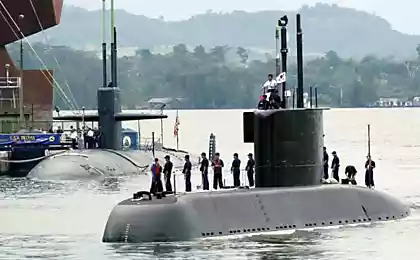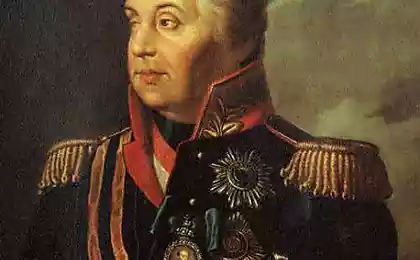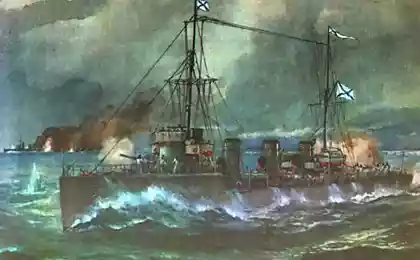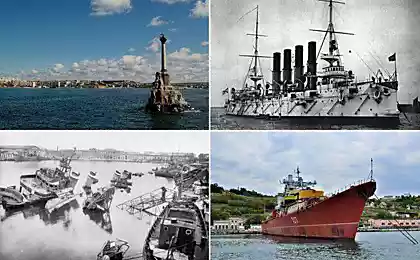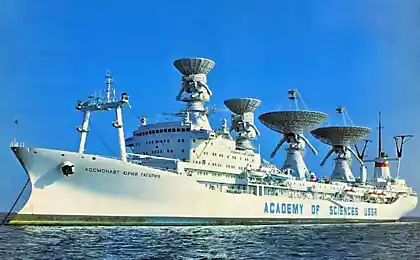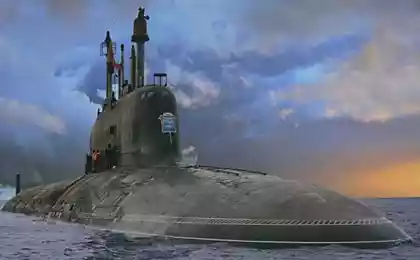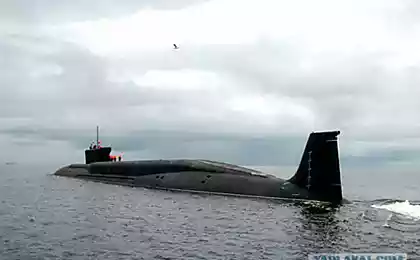1187
"Attack of the Century"
100th anniversary of the hero of the Soviet Union Alexander Marinesco, the legendary commander of the submarine "S-13". Sinking Marinesko team in January 1945 a major Nazi ship "Wilhelm Gustav" was called the most daring attack of the twentieth century.
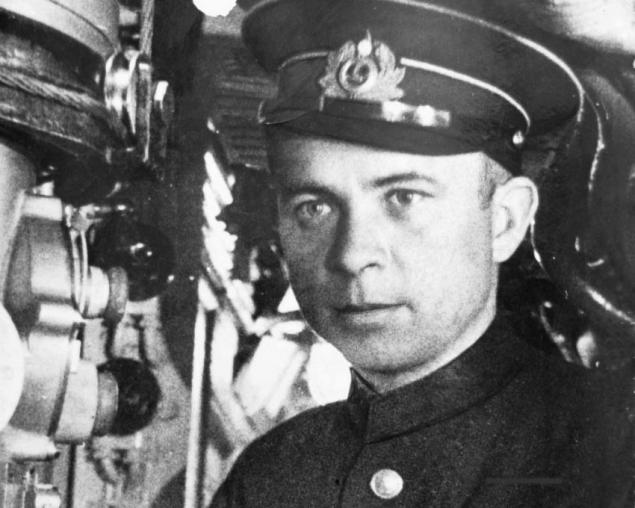
Marinescu was born in Odessa, a child loved and knew the sea, dive and swim well learned in the 7 years. According to the memoirs of Marinesko every morning together with friends, they went to sea and spent time there in swimming and fishing steers, mackerel, and flounder chirusa.
Biographers argue about youth crime Marinesko. Odessa at that time was really gangster city, just as Babel described her in his famous stories.
Inherited from his father, a sailor and Romanian nationality, Marinesko got violent temper and desire for adventure. In 1893, Marinescu, Senior beat officer, has been on trial, where he faced the death penalty. He escaped from the punishment cell, crossed the Danube, married to a Ukrainian, a long time in hiding.
Everything seemed to be in character and biography Marinesko Jr. led to the fact that he become captain of the Soviet merchant vessel in the Black Sea, a smuggler and humorist. But fate decided otherwise and Marinesko not the southern and the northern seas, not shopping and Navy, not the captain of the ship of the sea, and the commander of the underwater predator.
Of the 13 diesel-electric attack submarines of the Baltic fleet "C" class (average), during the war, only one survived, under an unlucky number 13. The one commanded Odessa Marinesko.
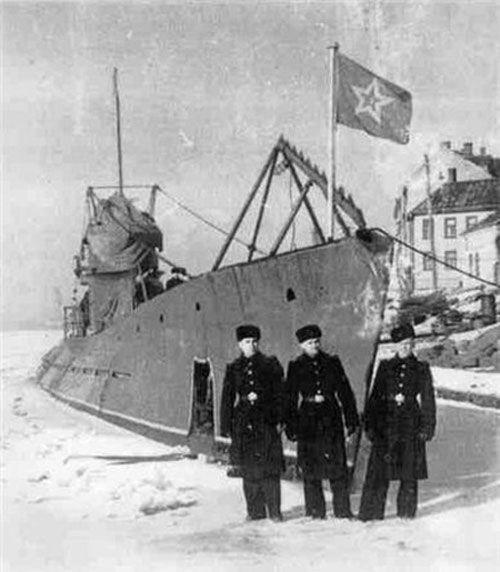
Author of the book devoted to the Soviet apologetic Marinesko - "sea captain" - Alexander Kron recalls his first encounter with the legendary submariner took place in 1942: Marinesko drank alcohol with colleagues.
"Drunk" The story is a Marinesko regularly. In October 1941, the submariner was expelled from the candidate members of the CPSU (b) for the organization of casino card games, and the abuse of alcohol. Exactly one year later, the then commander of the boat M-96, Marinesko successfully landed in the Gulf of Narva Soviet troops, the hunt for the German cipher machine "Enigma". The operation ended in failure - the car was never found - but the action of the submariner was rated highly, Marinesko presented an award and reinstated a candidate member of the party, but in live performance again mentioned the addiction to alcohol.
In April 1943, Marinescu was appointed commander of the boat S-13, the one on which he made his main military exploits. A civilian "exploits" he never stopped: "Over the summer and fall of the forty-third Marinesko twice visited the guardhouse, and the party line received a warning, and then reprimanded. The reason for sanctions was not drinking alone, drinking while Alexander is not more than others, and in one case, absence without leave, in another - late ».
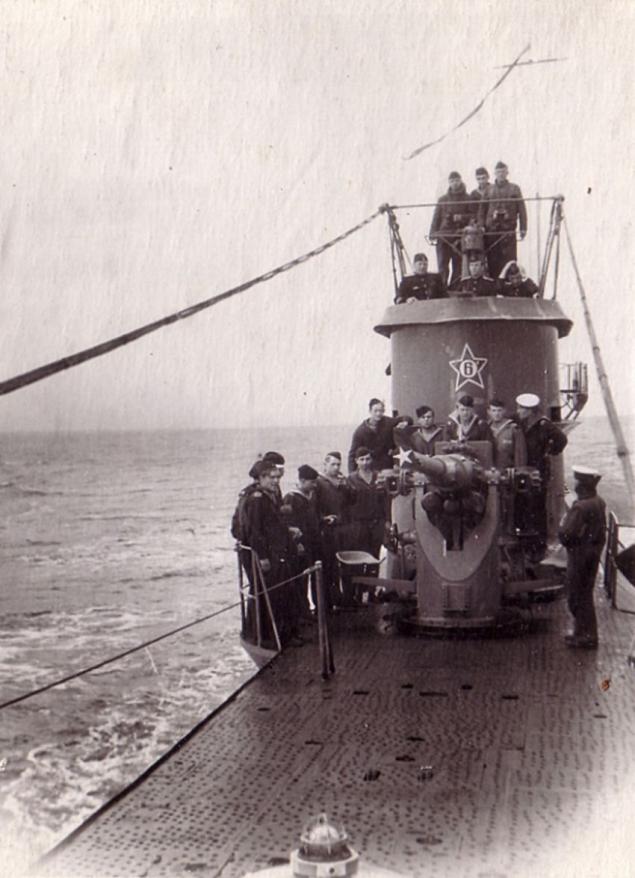
The most scandalous incident, after which Marinesko almost given by a military tribunal, happened to him in early 1945. It took place in Turku, Finland, on neutral territory. In October 1944, during the military raid crew Marinesko destroyed German transport "Siegfried": Soviet submarine torpedo attack failed and the sailors joined the artillery duel, which won the C-13, received, however, the damage.
Therefore, from November to December 1944 C-13 is being repaired in Finland. Team Captain languished in idleness, attacked the blues. Throughout his life Marinesko was married three times and at the time his marriage was falling apart the next. In the New Year's Eve Marinesko with yet another Soviet officer went to the town red ... and lost.
As it turned out, Marinesko met with the mistress of one of the local hotels, Swede, and she stayed the night. Commander of Soviet submarine spotted. Time - War, Finland had just emerged from the war in general, concerns were different. But Marinesko just have fun - love of women was stronger sense of duty.
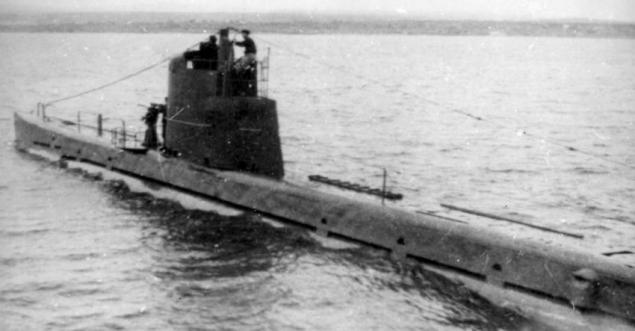
After the scandal of Finnish Marinesko have been one way - a tribunal. But the team loved commander, and heads valued as an experienced sailor, although at that time the outstanding successes of the martial Marinesko not listed. Baltic Fleet Commander Vladimir Tributs decided to postpone punishment: as S-13 was the only "penalty" by boat, by analogy with penal battalions in the Soviet Navy. In January 1945 Marinesko campaign, in fact, he went beyond feat. Only a very large sea "production" could save him from punishment.
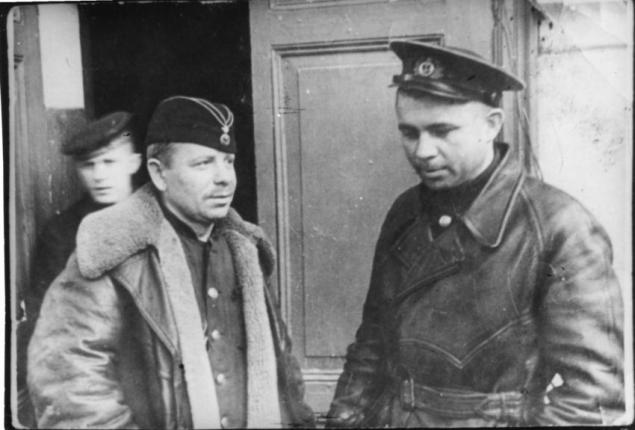
Almost a month unsuccessfully C-13 cruised in a given area. Detected a submarine failed. Marinescu decides to violate the order and change course. What motivated them? Passion, flair, or the need to distinguish the sailor waved his hand, saying, "seven evils one answer '- we will never know.
On January 30, 21 hours 15 minutes C-13 found in the Baltic waters which went to escort German transport "Wilhelm Gustloff", which was carrying on the current estimates of more than 10 thousand people, most of whom were refugees from East Prussia: the elderly, children, women. But also "Gustlove" cadets were German submariners, crew members and other military personnel.
Marinesko started hunting. Almost three hours the Soviet submarine followed the giant transporter (displacement "Gustlova" more than 25 thousand tons. In comparison, the steamer "Titanic" and the battleship "Bismarck" had a displacement of about 50 thousand tons).
Choosing a time Marinesko attacked "Gustlova" three torpedoes, all of which hit the target. Fourth torpedo with the inscription "For Stalin" is stuck. Sailors narrowly escaped an explosion on the boat. Departing from the persecution of the German military escort, the C-13 was bombed more than 200 depth charges.
Ten days later, the C-13 flooded another German giant liner "SS General von Steuben 'displacement of nearly 15,000 tons.
Thus, winter hike Marinesko became the most prominent militant raid in the history of Soviet submarine fleet, but the commander and the crew was deprived of the deserved awards and fame. Perhaps because Marinescu and his team are the least like the textbook Soviet heroes.
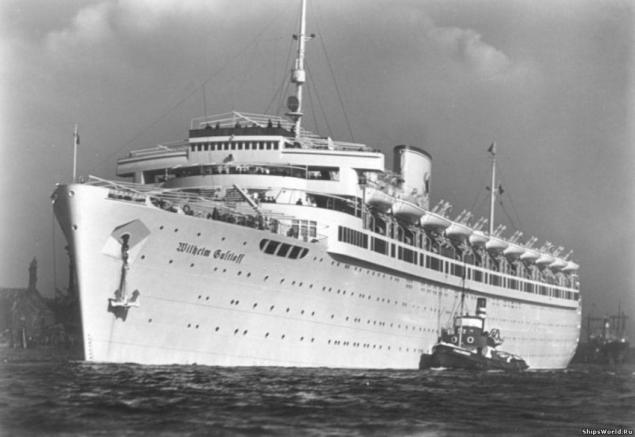
Sixth raid that Marinesko made in spring 1945, was considered a failure. According to the testimony of people who knew Marinescu, he started having epileptic fits, and conflicts with his superiors and drunken stories continued. Submariner supposedly self-addressed leadership to dismiss him from the Navy, but in the order of People's Commissar of the Navy NG Kuznetsov said about dismissal "because of the negligence of their duties, drunkenness and debauchery home».
In the late forties Marinesko finally gave up the sea and became deputy director of the Leningrad Research Institute of Blood Transfusion. Strange choice! Soon Marinesko was accused of embezzlement and sentenced to three years: incomprehensible act for those years is quite a lenient sentence. However, the term of the legendary submariner serving in Kolyma.
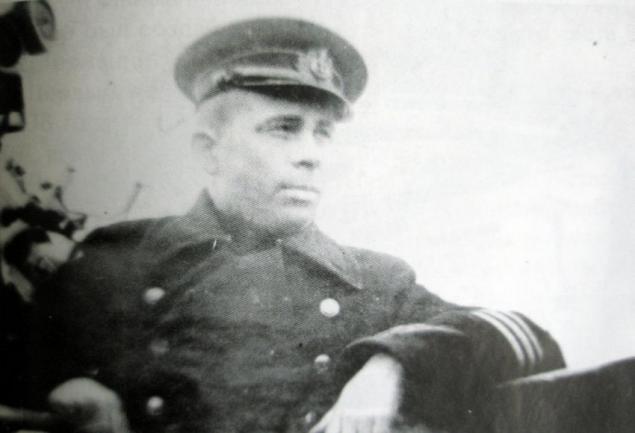
The debate about the identity of the legendary Marinesko and "Attack of the century" do not cease fifty years. What was it? Immediately after World War II in the museum of the Royal Navy of Great Britain was a monument Marinesko. In the USSR team was deprived of deserved awards, a feat silenced, and in 1967 in the newspaper "Soviet Baltiets" published an article, which said that the "Gustloff" stoked Mate Efremenkov and Marinescu was "out of service».
In the mid-80s "Izvestia" newspaper started a two-year war with the Ministry of Defense and the leadership of the Navy, according to the publication Marinesko undeservedly forgotten hero, the military held a different point of view. Even Marinesko daughters from different marriages differently treated the identity of the father: one considered him a scoundrel, others due to people trying to restore the good name of Alexander Ivanovich.
Abroad, relating to the identity Marinesko too ambiguous. Nobel Prize winner for literature Günter Grass published "Crabwalk" - artistic research "Attack of the century" - where in the darkest colors described Soviet submarine commander. American journalist John Miller twice came to the Soviet Union for information about Marinesko to write a book about a drunkard and a rebel, for desperate boldness acquire fame "underwater ace».
Later the military certification Marinesko full of reprimands and other "official mismatch", but in one of his early naval teacher wrote: "It may neglect personal interests for the sake of life," and even, ostensibly, have very short response: "capable of feats».
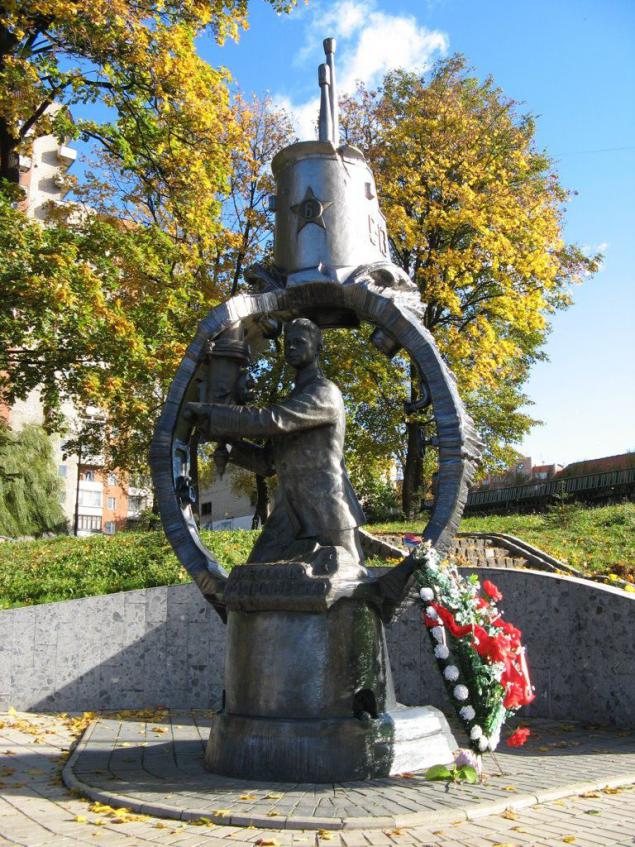
Marinesco in Leningrad died after a serious and prolonged illness on Nov. 25, 1963. He was buried at the Theological cemetery in St. Petersburg. Here nearby (Kondratievsky ave., 83), the Museum of Russian submarine forces them. AI Marinesco.
The title of Hero of the Soviet Union Alexander Marinesko conferred posthumously on May 5, 1990.
--img9--
Source:

Marinescu was born in Odessa, a child loved and knew the sea, dive and swim well learned in the 7 years. According to the memoirs of Marinesko every morning together with friends, they went to sea and spent time there in swimming and fishing steers, mackerel, and flounder chirusa.
Biographers argue about youth crime Marinesko. Odessa at that time was really gangster city, just as Babel described her in his famous stories.
Inherited from his father, a sailor and Romanian nationality, Marinesko got violent temper and desire for adventure. In 1893, Marinescu, Senior beat officer, has been on trial, where he faced the death penalty. He escaped from the punishment cell, crossed the Danube, married to a Ukrainian, a long time in hiding.
Everything seemed to be in character and biography Marinesko Jr. led to the fact that he become captain of the Soviet merchant vessel in the Black Sea, a smuggler and humorist. But fate decided otherwise and Marinesko not the southern and the northern seas, not shopping and Navy, not the captain of the ship of the sea, and the commander of the underwater predator.
Of the 13 diesel-electric attack submarines of the Baltic fleet "C" class (average), during the war, only one survived, under an unlucky number 13. The one commanded Odessa Marinesko.

Author of the book devoted to the Soviet apologetic Marinesko - "sea captain" - Alexander Kron recalls his first encounter with the legendary submariner took place in 1942: Marinesko drank alcohol with colleagues.
"Drunk" The story is a Marinesko regularly. In October 1941, the submariner was expelled from the candidate members of the CPSU (b) for the organization of casino card games, and the abuse of alcohol. Exactly one year later, the then commander of the boat M-96, Marinesko successfully landed in the Gulf of Narva Soviet troops, the hunt for the German cipher machine "Enigma". The operation ended in failure - the car was never found - but the action of the submariner was rated highly, Marinesko presented an award and reinstated a candidate member of the party, but in live performance again mentioned the addiction to alcohol.
In April 1943, Marinescu was appointed commander of the boat S-13, the one on which he made his main military exploits. A civilian "exploits" he never stopped: "Over the summer and fall of the forty-third Marinesko twice visited the guardhouse, and the party line received a warning, and then reprimanded. The reason for sanctions was not drinking alone, drinking while Alexander is not more than others, and in one case, absence without leave, in another - late ».

The most scandalous incident, after which Marinesko almost given by a military tribunal, happened to him in early 1945. It took place in Turku, Finland, on neutral territory. In October 1944, during the military raid crew Marinesko destroyed German transport "Siegfried": Soviet submarine torpedo attack failed and the sailors joined the artillery duel, which won the C-13, received, however, the damage.
Therefore, from November to December 1944 C-13 is being repaired in Finland. Team Captain languished in idleness, attacked the blues. Throughout his life Marinesko was married three times and at the time his marriage was falling apart the next. In the New Year's Eve Marinesko with yet another Soviet officer went to the town red ... and lost.
As it turned out, Marinesko met with the mistress of one of the local hotels, Swede, and she stayed the night. Commander of Soviet submarine spotted. Time - War, Finland had just emerged from the war in general, concerns were different. But Marinesko just have fun - love of women was stronger sense of duty.

After the scandal of Finnish Marinesko have been one way - a tribunal. But the team loved commander, and heads valued as an experienced sailor, although at that time the outstanding successes of the martial Marinesko not listed. Baltic Fleet Commander Vladimir Tributs decided to postpone punishment: as S-13 was the only "penalty" by boat, by analogy with penal battalions in the Soviet Navy. In January 1945 Marinesko campaign, in fact, he went beyond feat. Only a very large sea "production" could save him from punishment.

Almost a month unsuccessfully C-13 cruised in a given area. Detected a submarine failed. Marinescu decides to violate the order and change course. What motivated them? Passion, flair, or the need to distinguish the sailor waved his hand, saying, "seven evils one answer '- we will never know.
On January 30, 21 hours 15 minutes C-13 found in the Baltic waters which went to escort German transport "Wilhelm Gustloff", which was carrying on the current estimates of more than 10 thousand people, most of whom were refugees from East Prussia: the elderly, children, women. But also "Gustlove" cadets were German submariners, crew members and other military personnel.
Marinesko started hunting. Almost three hours the Soviet submarine followed the giant transporter (displacement "Gustlova" more than 25 thousand tons. In comparison, the steamer "Titanic" and the battleship "Bismarck" had a displacement of about 50 thousand tons).
Choosing a time Marinesko attacked "Gustlova" three torpedoes, all of which hit the target. Fourth torpedo with the inscription "For Stalin" is stuck. Sailors narrowly escaped an explosion on the boat. Departing from the persecution of the German military escort, the C-13 was bombed more than 200 depth charges.
Ten days later, the C-13 flooded another German giant liner "SS General von Steuben 'displacement of nearly 15,000 tons.
Thus, winter hike Marinesko became the most prominent militant raid in the history of Soviet submarine fleet, but the commander and the crew was deprived of the deserved awards and fame. Perhaps because Marinescu and his team are the least like the textbook Soviet heroes.

Sixth raid that Marinesko made in spring 1945, was considered a failure. According to the testimony of people who knew Marinescu, he started having epileptic fits, and conflicts with his superiors and drunken stories continued. Submariner supposedly self-addressed leadership to dismiss him from the Navy, but in the order of People's Commissar of the Navy NG Kuznetsov said about dismissal "because of the negligence of their duties, drunkenness and debauchery home».
In the late forties Marinesko finally gave up the sea and became deputy director of the Leningrad Research Institute of Blood Transfusion. Strange choice! Soon Marinesko was accused of embezzlement and sentenced to three years: incomprehensible act for those years is quite a lenient sentence. However, the term of the legendary submariner serving in Kolyma.

The debate about the identity of the legendary Marinesko and "Attack of the century" do not cease fifty years. What was it? Immediately after World War II in the museum of the Royal Navy of Great Britain was a monument Marinesko. In the USSR team was deprived of deserved awards, a feat silenced, and in 1967 in the newspaper "Soviet Baltiets" published an article, which said that the "Gustloff" stoked Mate Efremenkov and Marinescu was "out of service».
In the mid-80s "Izvestia" newspaper started a two-year war with the Ministry of Defense and the leadership of the Navy, according to the publication Marinesko undeservedly forgotten hero, the military held a different point of view. Even Marinesko daughters from different marriages differently treated the identity of the father: one considered him a scoundrel, others due to people trying to restore the good name of Alexander Ivanovich.
Abroad, relating to the identity Marinesko too ambiguous. Nobel Prize winner for literature Günter Grass published "Crabwalk" - artistic research "Attack of the century" - where in the darkest colors described Soviet submarine commander. American journalist John Miller twice came to the Soviet Union for information about Marinesko to write a book about a drunkard and a rebel, for desperate boldness acquire fame "underwater ace».
Later the military certification Marinesko full of reprimands and other "official mismatch", but in one of his early naval teacher wrote: "It may neglect personal interests for the sake of life," and even, ostensibly, have very short response: "capable of feats».

Marinesco in Leningrad died after a serious and prolonged illness on Nov. 25, 1963. He was buried at the Theological cemetery in St. Petersburg. Here nearby (Kondratievsky ave., 83), the Museum of Russian submarine forces them. AI Marinesco.
The title of Hero of the Soviet Union Alexander Marinesko conferred posthumously on May 5, 1990.
--img9--
Source:

